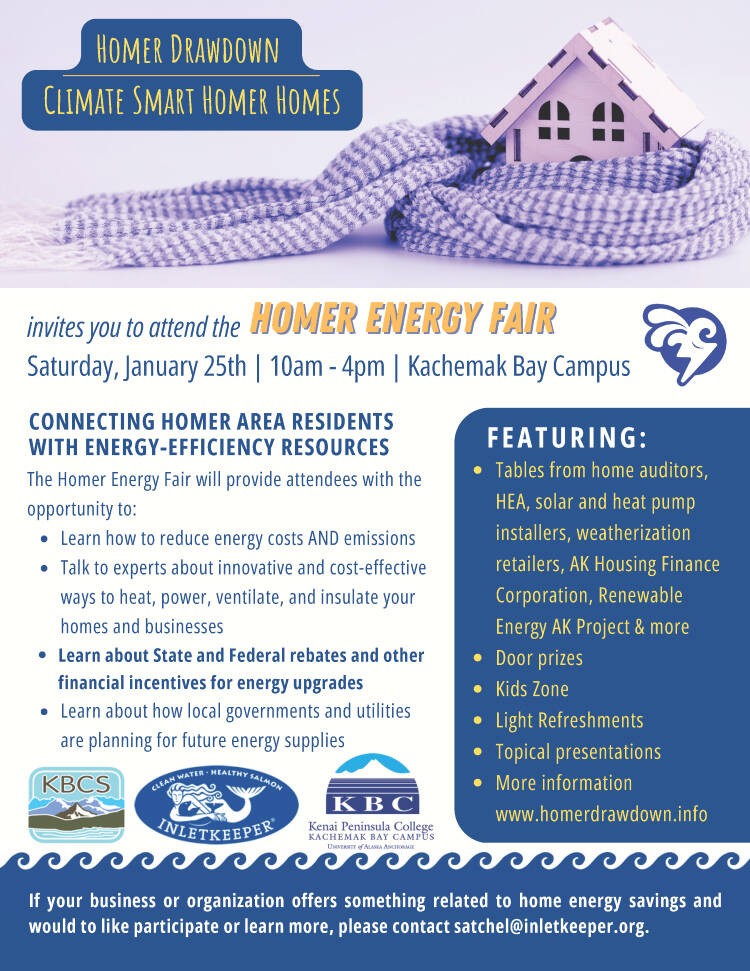Clean, affordable energy? It does exist, right here, at our fingertips on the Kenai Peninsula.
It’s the energy we don’t use.
Energy conservation and efficiency have multiple benefits: Lower utility bills, reduced carbon emissions, and cozier, more comfortable homes with better indoor air quality, to name a few.
Our homes are our refuges: retreats from the world, places to share with family and friends, where we go to rest, recover and relax.
Energy efficiency is one of the best ways to reduce or contain residential energy costs. In Alaska’s current case of dwindling gas supplies, and expected increasing costs, protecting ourselves from forces beyond our control makes more sense now than ever.
Cook Inlet natural gas faces a shortfall as soon as 2027. It is likely that natural gas prices will rise at least 50%. Rising natural gas prices will consequently increase the cost of electricity on the Kenai Peninsula, where natural gas generates, on average in recent years, about 88% of Homer Electric Association power. The Alaska attorney general has petitioned the Regulatory Commission of Alaska to plan and regulate curtailment of gas use should shortages occur when supplies are tight.
We could see price hikes within two years, if local gas producers find it cheaper to import gas than to produce more from Cook Inlet.
Energy efficiency makes your home more affordable. Mortgages for qualifying homes are available at a reduced interest rate through HUD, AHFC and the VA, lowering your cost over the life of the mortgage. Such homes also have lower costs for repairs, maintenance, fuel, electricity and, arguably, health care for the residents.
You can boost energy efficiency several ways. Well-insulated homes reduce heating fuel use; be it oil, gas, or non-combustible sources such as heat pumps. State-of-the-art appliances use less electricity. Renewables such as solar power further reduce your utility bills. Well-sealed homes reduce heat loss, drafts felt around windows, and damaging ice dams on the roof and around gutters. Mechanically ventilated homes have better indoor air quality, and fewer problems from mold, dust, erratic humidity or other pollutants such as radon, smoke, combustion by-products and off-gassing building materials. Proper ventilation, moisture and temperature controls also make homes more durable by avoiding moisture-level fluctuations and condensation causing general decay.
Such homes are safer, healthier and more comfortable for the occupants. Last but not least, energy-efficient homes reduce fossil fuel emissions, conserve resources, and are therefore climate friendly and sustainable.
Do you want to learn how to implement these energy efficient systems and practices into your home or business? If so, the upcoming free and family-friendly Homer Energy Fair is the place to be.
The Homer Energy Fair will be Jan. 25 at the college’s Kachemak Bay Campus from 10 a.m. to 4 p.m. Presentations, vendors, refreshments, and entertainment for your kids will be included. Agencies, organizations and experts will be on hand to share info and answer questions. Those signed up are a diverse lot, including the Alaska Housing Finance Corporation, Homer Electric Association, Renewable Alaska Energy Project (REAP), the Kenai Peninsula Electric Vehicles Owners Group; plus a variety of local businesses offering home weatherization products and services, home inspectors, and solar installers.
Learn about the most affordable means of controlling your energy costs, where to apply those measures in your home, what you can do yourself, and when and how to hire professional help. Presentations will focus on education opportunities, rebate programs and financial incentives available, and how to determine what you need to manage an energy efficiency project for your home.
The Homer Drawdown group, a network of concerned community members seeking to mitigate some of the effects of climate change, is sponsoring the Homer Energy Fair. The group’s current project focuses on energy-smart homes for a changing climate. Improving residential energy efficiency, providing residential renewable energy opportunities, and assisting the public with signing up for the Alaska Weatherization Assistance Program are parts of the project.
As an example of how these options help people, Homer Drawdown project volunteers already heard in 2024 from more than a dozen area residents who recently installed heat pumps in their homes, businesses, or outbuildings. While saving money is not always the primary incentive, users overwhelmingly report being pleased with the new heating technology, praising it as simpler, cleaner, and quieter than older furnace types. At a recent event in November, more than 100 people turned out for a presentation on heat pumps.
Homer Drawdown is a volunteer project. The members of its fair planning committee who wrote this letter are, in alphabetical order, Mike Haines, Yvonne Leutwyler, Shana Loshbaugh and Scott Waterman.

